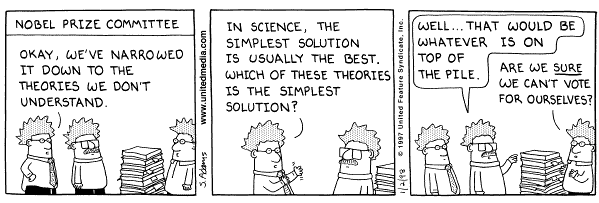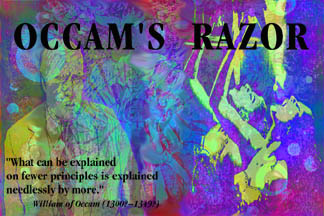
Occam's Razor
Occam's Razor is a corollary that can be applied to any complex situation. Taking away the supernatural and the incredible, the simplest explanation is usually true. It featured prominently in the movie Contact with Jody Foster (of which a thought provoking review can be found here).

Occam's (or Ockham's) razor is attributed to the medieval English philosopher and Franciscan monk, William of Occam (1280-1349) . Ockham was the village in the English county of Surrey where he was born. He received his bachelor's degree at Oxford, and his master's at Paris, where he taught from a date between 1315 and 1320.
The principle states "Entities should not be multiplied unnecessarily." Sometimes it is quoted in one of its original Latin forms to give it an air of authenticity:
"Pluralitas non est ponenda sine neccesitate"
English: "plurality should not be posited without necessity."
 William used the principle to justify many conclusions including the statement that "God's existence can not be deduced by reason alone."
This combined with differing view with the pope on living a minimalist life of
poverty led to his excommunication by Pope John XXII. He responded by
writing a treatise demonstrating that Pope John was a heretic.
William used the principle to justify many conclusions including the statement that "God's existence can not be deduced by reason alone."
This combined with differing view with the pope on living a minimalist life of
poverty led to his excommunication by Pope John XXII. He responded by
writing a treatise demonstrating that Pope John was a heretic.
Like Darwin's theories on evolution, it is caimed that Occam's Razor was a common principle in medieval philosophy and was not originated by William of Ockham but because of his frequent usage of the principle, his name has become indelibly attached to it. Regardless, it is unlikely that William would appreciate the application of his principle. For example, atheists often apply Occam's razor in arguing against the existence of God on the grounds that God is an unnecessary hypothesis. We can explain everything without assuming the extra metaphysical baggage of a Divine Being.
Many scientists have adopted or reinvented Occam's Razor as in Leibniz' "identity of observables" and Isaac Newton stated the rule: "We are to admit no more causes of natural things than such as are both true and sufficient to explain their appearances."
The most useful statement of the principle for scientists is "when you have two competing theories which make exactly the same predictions, the one that is simpler is the better."
An example is Einstein's theory of special relativity compared with Lorentz's theory that rulers contract and clocks slow down when in motion through the Ether. Einstein's equations for transforming space-time are the same as Lorentz's equations for transforming rulers and clocks, but Einstein and Poincar recognized that "the Ether" could not be detected according to the equations of Lorentz and Maxwell. By Occam's razor it had to be eliminated.
Crop Circles are a real life example of Occam's Razor in practice. Crop circles began to be reported in the 1970s. Two interpretations were made of the circles of matted grass. One was that flying saucers made the imprints. The other was that someone (human) had used some sort of instruments to push down the grass. Occam's Razor would say that given the lack of evidence for flying saucers and the complexity involved in getting UFOs from distant galaxies to arrive on Earth (unseen and traveling faster than the speed of light) the second interpretation is simplest. The second explanation could be wrong, but until further facts present themselves, it remains the preferable theory. As it turns out, Occam's Razor indicated the correct hypothesis: two people admitted to making the crop figures in the 1990s. Despite this fact, some people still ignore Occam's Razor and instead continue to believe that crop circles are being created by flying saucers.
http://www.2think.org/occams_razor.shtml
Spontaneous human combustion is another urban legend that is easily debunked by applying Occam's Razor. Click here for a thorough explanation.
"We could still imagine that there is a set of laws that determines events completely for some supernatural being, who could observe the present state of the universe without disturbing it. However, such models of the universe are not of much interest to us mortals. It seems better to employ the principle known as Occam's razor and cut out all the features of the theory which cannot be observed."
– Stephan Hawking
A Brief History of Time
But uncertainty and the non-existence of the ether can not be deduced from Occam's Razor alone. It can separate two theories which make the same predictions but does not rule out other theories which might make a different prediction. Empirical evidence is also required and Occam himself argued for empiricism, not against it.
Occam's razor is often cited in stronger forms than Occam intended, as in the following statements...
"If you have two theories which both explain the observed facts then you should use the simplest until more evidence comes along"
"The simplest explanation for some phenomenon is more likely to be accurate than more complicated explanations."
"If you have two equally likely solutions to a problem, pick the simplest."
"The explanation requiring the fewest assumptions is most likely to be correct."
... or in the only form which takes its own advice...
"Keep things simple!"
Notice how the principle has strengthened in these forms which should be more correctly called the law of parsimony, or the rule of simplicity. To begin with we used Occam's razor to separate theories which would predict the same result for all experiments. Now we are trying to choose between theories which make different predictions. This is not what Occam intended. Should we not test those predictions instead? Obviously we should eventually, but suppose we are at an early stage and are not yet ready to do the experiments. We are just looking for guidance in developing a theory.
This principle goes back at least as far as Aristotle who wrote "Nature operates in the shortest way possible." Aristotle went too far in believing that experiment and observation were unnecessary. The principle of simplicity works as a heuristic rule-of-thumb but some people quote it as if it is an axiom of physics. It is not. It can work well in philosophy or particle physics, but less often so in cosmology or psychology, where things usually turn out to be more complicated than you ever expected. Perhaps a quote from Shakespeare would be more appropriate than Occam's razor: "There are more things in heaven and earth, Horatio, Than are dreamt of in your philosophy.".
Simplicity is subjective and the universe does not always have the same ideas about simplicity as we do.
The final word falls to Einstein, himself a master of the quotable one liner. He warned,
"Everything should be made as simple as possible, but not simpler."